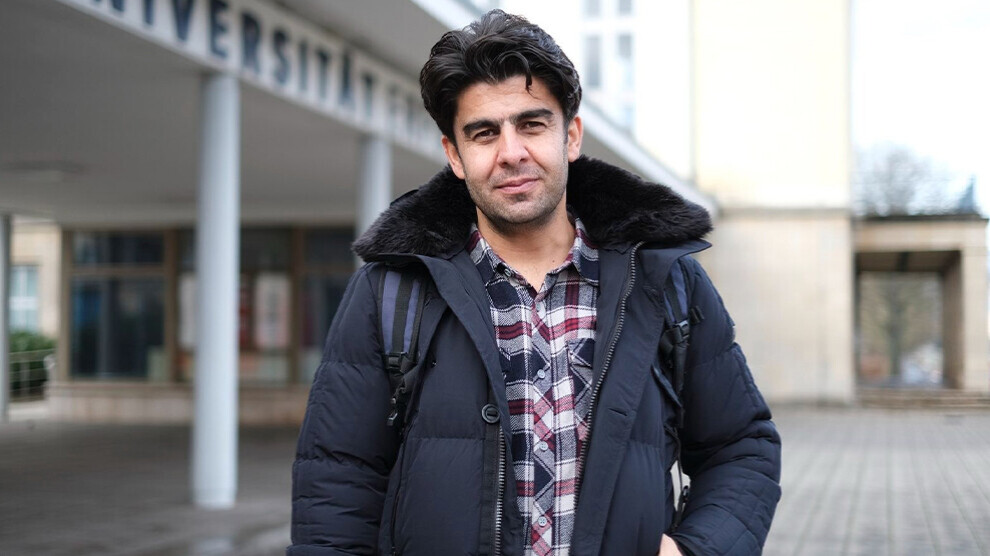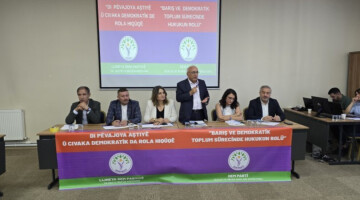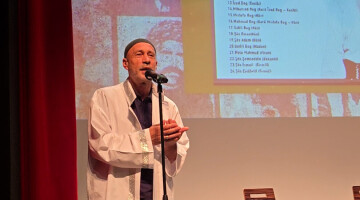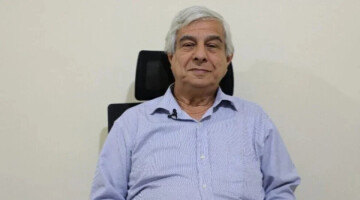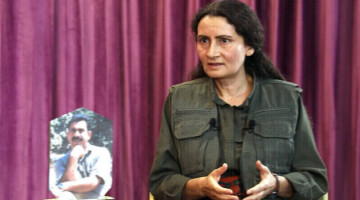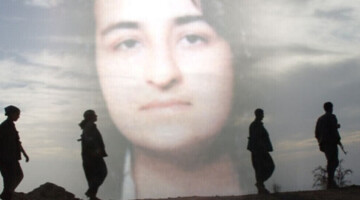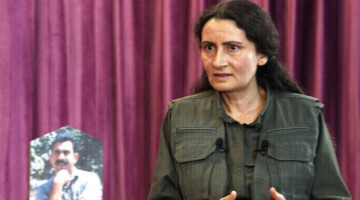Since April of this year and also in the previous year, massive military operations have been taking place in Southern Kurdistan (Northern Iraq) by the Turkish army. Prohibited warfare agents were used again and again. The KRG government supports Turkey's military operations. In neighboring Iran and above all in the Kurdish areas of Iran, massive uprisings against the government have been taking place since September 16, i.e. for two months, after the Kurdish woman Jîna Mahsa Aminî was killed by the Iranian security police. ANF spoke to South Kurdish journalist Kamal Chomani to find out more about the background.
Kamal Chomani is a political analyst and non-resident fellow at the Kurdish Peace Institute.
The Kurdish Peace Institute (KPI) is an independent nonpartisan research and policy institute based in Washington D.C. Our aim is to educate policy makers and the wider public on the Kurdish people and the region of Kurdistan.
Journalist Zac Koppelin was able to prove that Masour Barzani bought a house for $12 million in the USA. It is generally known that the Barzanis have established a system of exploitation of Kurdistan's wealth and corruption. Can you explain to us how Barzani, the KRG regime's power structure works?
The formal institutions in the Kurdistan Region of Iraq (KRI) do not function as per the Iraqi and KRI functioning laws, because the informal institutions in the KRI are way stronger than the formal institutions. Tribal, family, and party relations have always bypassed the KRI institutions. In theory, the KRI owns a sort of democratic system where, legally, the powers are separated and independent, and the Peshmerga and security apparatus are part of the KRI system. However, in practice, no powers are independent, including the judiciary. The parliament is the weakest powe. It is already undermined by the two ruling parties, the Kurdistan Democratic party (KDP) and the Patriotic Union of Kurdistan (PUK), and mainly by the KDP. For instance, the Parliament makes no decisions without returning to the party and family leaders. In 2013, the Parliament could not enjoy its legal mandate. Therefore, the KDP and PUK forced their members to extend Masoud Barzani's term illegally. Then in 2015, when the parliament wanted to again decide on the future of Masoud Barzani, Barzani closed parliament for two years.
The MPs and the Kurdistan Parliament Speakership are clients of the Talabani and Barzani families. They cannot do anything that is not in line with these two families' interests. The KDP and PUK own Peshmerga and security forces; that is against the Iraqi Constitution and the very KRI laws. Their militias are brutal, serving the interests of the regional powers, mainly Turkey. The judiciary is deeply politicized and the KDP and PUK can appoint their clients into the system. Interestingly, even the judiciary council and court of appeals judges are divided between the KDP and PUK.
In brief, the KRI political system works in line with the KDP and PUK. That's to say, the Barzani and Talabani families' interests and wishes. These two parties are family parties. Both parties have two parallel offices; Barzani Headquarters and Talabani Secretary. These two offices are way stronger than parliament, the government, and the judiciary. The KRG cannot make any policies that both families do not agree with. If one KRG policy is not in the other party's interests, it will not be implemented in the other party's territory. Last but not least, we theoretically have a united government, but practically, we have two zones; KDP and PUK zones, which is the aftermath of the war between the two parties of the 1990s.
From our comrades in the KRG, for example from Tevgera Azadî, we hear every day about unbelievable repression against the political organization of an alternative. You once said that there is no alternative to democracy, but can one still speak of democracy when opposition members are subjected to such repression?
The KRG is absolutely not a democracy anymore. We were in a democratic transition from 2003 to 2013. During those 10 years, there was a fight for freedom and democracy despite the KDP and PUK repression, oppression, and corruption. However, since 2013, the KDP and PUK have continuously and successfully consolidated power to an extent that there is no more free media and non-partisan civil society. The KDP and PUK do not allow any dissent to thrive, and critics of the KRG are being killed, exiled, silenced, and imprisoned. Currently, we have tens of journalists and activists in prison. When it comes to alternative ideas, that's to say mainly the people who have organized around Mr. Abdullah Öcalan's social, political, economic, communalist, and gender equality thinking, the repression is way more brutal. It was mainly the KDP that was intolerant towards any pro-Öcalan movement in the KRI. However, the PUK has also joined the repression.
Currently, an extermination operation by the Turkish army is underway in Kurdistan against the guerrilla HPG and YJA Star. The Turkish army has established dozens of military bases in the Kurdish mountains. Can you explain to us why the government of South Kurdistan and also that of Iraq are not taking action on the aggressive occupation and political killings?
The KRG is a government that is mainly led by the KDP, and especially when it comes to regional and foreign affairs, the KDP has almost absolute power. Therefore, it is not the KRG who is not taking actions against the Turkish occupation, it is the KRG that is facilitating the occupation. The KDP is one key part in the Turkish occupation of the KRI territories, and a key collaborator in the Turkish fight against the HP and YJA Star. As for the Iraqi government's inaction, there are several issues. First, Iraq is struggling with its crises. Secondly, Iraq does not care much about the Turkish-PKK fight. Let's not forget, the Iraqi Government has a weaker presence in the KRI than the Turkish Army. The KDP always prefers a Turkish presence rather than an Iraqi presence in the KRI territories. Let's be very frank, the KDP consider the PKK as an enemy, and the KDP believes its domestic weakness and brutal repression and corruption at some point will cause its destruction, and the only force that can help the KDP will be Turkey. Therefore, the KDP creates a false rhetoric that the PKK wants to take over the KRG. This is how the KDP brings more Turkish forces into the KRI. Meanwhile, the KDP has established strong economic and energy ties with Turkey, mainly the Erdoğan family and people in the army and intelligence.
The KRG is led by the parties and the KDP is responsible for anything happening in Duhok and Erbil and the PUK is responsible for anything happening in Sulaymaniyah because both parties are ruling their territories. Nevertheless, all political parties in the current coalition government are responsible for the policies of the KRI, although they have been unable to exert any influence since Masrour Barzani took over.
A number of comrades working for Democratic Confederalism in South Kurdistan have been murdered. Zekî Celebi or most recently Nagihan Akarsel, people who have been working in a democratic way in Kurdistan. Numerous civilians also lost their lives, and villages were evacuated. Chemical weapons are used against the YJA Star and HPG. Why is there no popular resistance against these crimes?
I believe there have been popular uprisings against the Turkish army. However, the KRG repression has been strong. Look, over 70 Behdinan activists and journalists[1] were imprisoned. That was mainly Masrour Barzani's response to cracking down on any protests in Behdinan. Some of those imprisoned were organizing and speaking against Turkish occupation. Each time there are any small protests in the KRI, the KDP and PUK thugs attack protesters. People have been protesting, but the KDP and PUK brutality has reached another level.
What is the role of NATO in the occupation of South Kurdistan by the Turkish army?
NATO could have put pressure on Turkey to stop the attacks, but it prefers to remain silent. And not only in the occupation of Kurdistan, which Turkey claims is fighting "terrorists", but also in the face of the Turkish occupation in Syria, where NATO forces - I mean the international coalition [fighting ISIS] - have an alliance with the Syrian Democratic Forces [SDF] there. NATO doesn't care who is fighting whom as long as it is not against its own strategic interests.
For a total of two months, an uprising has been taking place in Rojhilat [East Kurdistan] and throughout Iran. What role do Kurdish organizations and the Kurdish population play in this uprising?
The Kurdish population are at the forefront of the protests and they are playing a main role, and that has been manifested in the protests that predominated in the Kurdish cities and towns in the country. The Kurdish people responded to the killing of Jina Mahsa Amini very quickly. As for the Kurdish organizations, if we mean by organizations and political parties, they have been supportive abroad through organizing gatherings and protests worldwide, and their media platforms have helped deliver their message of "Jin, Jiyan, Azadi" [Woman, Life, Freedom]. I am rather impressed by the people inside the country, be Kurds or Azeris, Persians, Balochs, and Arabs. Their unity is unprecedented. Their messages are incredible. Coming together around "Jin, Jiyan, Azadi" is very revolutionary. Several uprisings have taken place in the past two decades in the Middle East, and some were even successful to some extent that were able to overthrow the system, like the Arab Spring in Tunisia and Egypt. However, those uprisings were not able to understand the structural problems of societies. Iran's Green Movement was asking for certain reforms. The Arab Spring was mainly an uprising against the political system without being able to give an alternative based on the realities of the countries. I am perplexed by the current protests in Iran that have even forced the traditional political parties to have a progressive stance toward the events in the country.
Already during the so-called revolution in Iran in 1979, the Kurds had established a self-government in the Kurdish areas of Iran. This was brutally attacked, their leaders murdered. What strength do Kurdish organizations have today?
The Kurdish political organizations might not be so strong today. However, the Kurdish civil society inside the country is strong. The Kurdish population is strong. The Kurdish organizations are as strong as the other Iranian parties. They are also close to the Kurdish cities. PJAK has an armed wing. The KDP-I and Komala also do. All of PJAK's armed members are in the mountains. KDP-I and Komala also have some bases in the mountains. This is a strength certain other parties lack. Mojahedin is no longer in the territory. The Shah's son remains strong within the Persian population in North America and to some extent in Europe. However, I believe the peoples of Iran can determine their future well. They have understood one-man rule and one-nation representation do not work in the country anymore. What I fear this time is not that the Kurdish parties might be excluded or fought in the aftermath of the collapse of the regime; my fear is rather the Kurdish party polarization and enmity. Certain parties do not accept the new realities in the country. The traditional parties are not aware of the new realities of the country. The new generation is educated and progressive. The traditional parties consider themselves as main interlocutors as they were in the 1970s and 1980s. But new parties have emerged. the new generation is probably more interested in Jin, Jiyan, Azadi than pure nationalistic rhetoric that cannot bring about structural radical changes in the country.
Is it conceivable that a situation like that in Syria will occur in Rojhilat, where the movement that advocates democratic confederalism among the peoples of the Middle East has been able to establish self-government in a part of the region?
The future is unpredictable. However, anything and everything is possible. The Iranian regime has only two options; either radical reforms to avoid Syrianization of the country, or keeping its brutal iron fist to delay Syrianization of the country. Democratic confederalism is the best solution for Iran. Iran is in need of a political ideology that can bring differences together. Iran has a history of accepting diversity. Cyrus the Great, who ruled Iran between 550-530 BCE, was one of the advocates of diversity. The Persian empire accepted differences better than the current Iranian regime. Iran mainly consists of Persians, Azeris, Kurds, Arabs, Balouchs and some other religious and ethnic "minorities". The past four decades of the Vilayat-e Faqih has repressed the rights of non-Shi'a and non-Persians. This is despite the fact that the Persians have also been repressed because the system has not been democratic. This must change.
Many Iranian journalists do not name the Kurdish identity of Jîna Amini, they don’t seem to be very well- informed about the multiple oppressions faced by Kurds, Baluch and other minorities in Iran. Is it possible that they make the Kurdish issue a side issue and can there be a common perspective for the peoples of Iran under these circumstances?
I think there are different people when it comes to protests. Some might believe that focusing on the entire country is better than dividing the protests by ethno-sectarian lines, and they do not mean to subjugate Kurds or any other nations. That's their pure idea and they believe in a democratic Iran for all. However, there are some Pan-Iranists who are living the fantasies of the former regime, and they are different from the current regime only in theory, not in practice. I do not think there are big differences between a secular dictator and a theocratic dictator. I believe both are dangerous to human rights and the peace and tranquility of society. We have experienced both; the Shah Regime and the Islamic Republic Regime. Both have been horrendous to the peoples of Iran, to its economy and nature.
PJAK has proposed to build a united front of Kurds under the flag of Mahabat. What are the reactions of other Kurdish organizations?
The Kurdish traditionalist parties do not want to deal with PJAK. One wing of Komala does, though. The traditionalist parties fear that PJAK will be the PYD of Rojava. They understand that Öcalan's thinking is strong within the youth in Rojhelat, especially within the students. PJAK, KDPI, and Komala, as well as other political parties, should come together and debate the future of Iran based on the interests of all the peoples. None can rule alone, none can be the only party. There will also be new parties if the regime ever changes. A project for the future of Rojhelat and Iran is the only way that gives the right to these parties to claim that they can represent the Kurds. Other than that, they will be considered self-interest-seeking parties that we have experienced in the Kurdistan Region of Iraq that brought nothing but destruction, war, and corruption.
There can probably only be an overthrow in Iran if armed forces oppose the regime's violence. Is it conceivable that parts of the military could show solidarity with the people's uprising or are there also other self-defense forces of the people that could oppose the regime?
I don't think that the Iranian armies, whether officially or informally, will fight on the side of the people against the regime. But I think that if the protests become bigger, especially in Tehran, and I don't mean those protests where "only" a few thousand take to the streets, then there will be less violence from the armies and security forces, which could lead to the regime either capitulating and reforming radically or collapsing and being overthrown. However, if the protests continue to take place only in the cities of Kurdistan and Balochistan, the future may not be what we want it to be.
[1] Behdinan prisoners were a group of over 70 journalists and activists arrested by KDP/Masrour Barzani for their critical stance towards KDP corruption, Turkish occupation in the KRI, the KDP’s repressive iron fist in the KRI against the dissent, and they were organizing protests, including the protests to call the KRI to pay monthly salaries of the KRI public servants, however, Masrour Barzani accused them of espionage

